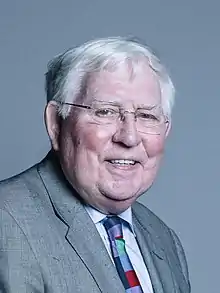Martin O'Neill, Baron O'Neill of Clackmannan
Martin John O'Neill, Baron O'Neill of Clackmannan (6 January 1945 – 26 August 2020) was a Scottish Labour politician who served as a Member of Parliament (MP) from 1979 until 2005 and as a member of the House of Lords from 2005 until his death.
The Lord O'Neill of Clackmannan | |
|---|---|
 Official portrait, 2018 | |
| Chair of the Trade and Industry Select Committee | |
| In office 27 November 1995 – 11 April 2005 | |
| Preceded by | Richard Caborn |
| Succeeded by | Peter Luff |
| Shadow Secretary of State for Defence | |
| In office 14 June 1988 – 18 July 1992 | |
| Leader | Neil Kinnock |
| Preceded by | Denzil Davies |
| Succeeded by | David Clark |
| Member of the House of Lords Lord Temporal | |
| In office 14 June 2005 – 26 August 2020 Life peerage | |
| Member of Parliament for Ochil
| |
| In office 3 May 1979 – 11 April 2005 | |
| Preceded by | George Reid |
| Succeeded by | Constituency abolished |
| Personal details | |
| Born | Martin John O'Neill 6 January 1945 |
| Died | 26 August 2020 (aged 75) |
| Nationality | British |
| Political party | Labour |
| Spouse |
Elaine Marjorie Samuel
(m. 1973) |
| Children | 2 |
| Education | Trinity Academy, Edinburgh |
| Alma mater | Heriot-Watt University |
Early life and career
He was educated at Trinity Academy, Edinburgh, at the time a selective state school, and then Heriot-Watt University, where he attained a BA in economics. After leaving university, he worked as an insurance clerk and then became active in the Scottish Union of Students, including serving as its president from 1970 until 1971.[1]
He married his wife Elaine Marjorie Samuel on 21 July 1973, with them going on to raise two sons together.[1]
Parliamentary career
After unsuccessfully contesting Edinburgh North in October 1974, he was a Labour Member of Parliament between 1979 and 2005, representing the Clackmannan and Eastern Stirlingshire, Clackmannan and Ochil seats successively. He was a shadow defence secretary and later was Chairman of the Trade and Industry select committee.
House of Lords
On 13 May 2005 it was announced that he would be created a life peer,[2] and on 14 June 2005 was created Baron O'Neill of Clackmannan, of Clackmannan in Clackmannanshire.[3]
Outside politics
O'Neill served as Chairman of the Strategic Forum for Construction and the Nuclear Industry Association.[4]
He was a lifelong supporter of Hibernian F.C. and was a director of the club for a few years.
O'Neill was also a patron of Humanists UK,[5] and was one of the fifty signatories to a letter published in The Guardian in 2010, which called for Pope Benedict XVI not to be given a state visit to the UK, and accused the Catholic Church of increasing the spread of AIDS and promoting segregated education.[6]
He received an Honorary Doctorate from Heriot-Watt University in 2011[7] and was an honorary associate of the National Secular Society.[8]
Death
O'Neill died in August 2020 at the age of 75.[9]
References
- "BBC NEWS | VOTE 2001 | CANDIDATES". news.bbc.co.uk. Archived from the original on 3 April 2016. Retrieved 17 August 2019.
- Tempest, Matthew; agencies (13 May 2005). "Labour becomes biggest party in Lords". guardian.co.uk. Archived from the original on 17 March 2014. Retrieved 25 May 2009.
- "No. 57677". The London Gazette. 17 June 2005. p. 7919.
- "Lord O'Neill of Clackmannan". Humanists UK. Archived from the original on 17 August 2019. Retrieved 17 August 2019.
- "Patrons". Humanists UK. Archived from the original on 5 October 2020. Retrieved 17 August 2019.
- Guardian Staff (14 September 2010). "Letters: Harsh judgments on the pope and religion". The Guardian. ISSN 0261-3077. Archived from the original on 9 January 2020. Retrieved 17 August 2019.
- "Heriot-Watt University Honorary Graduates, November 2011". Heriot-Watt University. Archived from the original on 5 March 2016. Retrieved 29 March 2016.
- "National Secular Society Honorary Associates". Archived from the original on 2 August 2019. Retrieved 5 June 2019. National Secular Society. Retrieved 5 June 2019
- "Lord O'Neill of Clackmannan, shadow minister who freed Labour from nuclear disarmament – obituary". The Telegraph. London. 2 September 2020. Archived from the original on 3 September 2020. Retrieved 2 September 2020.